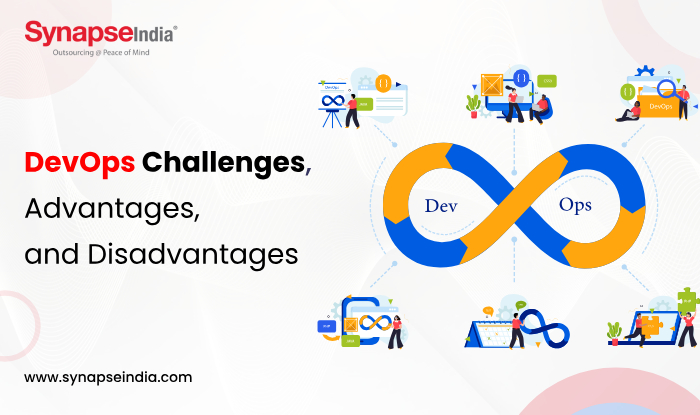 23 Feb 2024
23 Feb 2024“DevOps, a combination of development and operations, is a set of practices, methodologies, and cultural philosophies that aim to enhance collaboration and communication between software development teams and IT operations.”

Devops has been popular in the industry for reasons. Not as a tool or methodology but it has its own set of advantages. While Devops brings many benefits to the organization, a few possible challenges can be looked at while implementing the DevOps Lifecycle. In this post, let’s explore the possible challenges of DevOps and its advantages and disadvantages.
Being a popular term in the IT landscape it holds a lot of significance for business. DevOps is a combination of two terms Development and Operations. As signified by its name, DeVops is a set of practices that automates the tasks and processes between the software development and IT team, to build, test, and release software fast and more reliably. The development of the DevOps Lifecycle aims to shorten to provide continuous delivery with high-quality software. DevOps advantages help organizations to automate their waterfall traditional workflow and adopt agile methodology. In this way, organizations deliver software updates and new features much faster without compromising quality. This led to saving a lot of time and money and prevented any chances of potential human errors.
There are several reasons why implementing DevOps Lifecycle can be challenging. One of the major reasons is cultural change within the organization. To make the DevOps methodology successful, everyone in the organization should work synchronously, and everything should be on board toward the same goal. Here we have outlined a few challenges faced by organizations while using DevOps:
DevOps requires a fundamental change in organizational structure and culture to make it successful. This could be a challenge for many organizations, especially those that are bigger and carry a traditional approach. Additionally, DevOps require strong collaboration and communication between operations and development teams, which can sometimes be difficult to achieve.
The DevOps Lifecycle also includes many technical challenges, and the need for automated and standardized processes is one of the biggest across the entire organization. This becomes difficult, especially for an organization with a large number of platforms and applications. Also, another DevOps challenge is integrated into the existing environment without compromising performance and security.
In terms of operational challenges, one of the biggest challenges is managing deployment and rollback. This should be controlled in a safe manner which can cause a big operational challenge. Managing large and complex production environments can be difficult and critical to monitor and log for DevOps success to set up and maintain.
After studying the challenges we face in DevOps, here are the DevOps Advantages give to an organization:
The quick adoption of DevOps in the organization results in faster delivery of software. Businesses can help the market to respond to market changes and consumer needs changes. Software development can be automated and streamlined by quickly fixing DevOps and also altering to fix bugs and software vulnerabilities quickly.
DevOps helps organizations to develop software which are of high quality. This can be done by integrating automated testing tools into the software development process. Businesses can easily detect and fix potential errors at an earlier stage. DevOps also encourage collaboration between developers and operational staff, leading to a better understanding of how software is deployed and used during production. Additionally, this turns into enhancing the overall quality of the software.
DevOps Lifecycle promotes collaboration and communication between developers and operational staff. Businesses can easily streamline the process of software development by breaking down the silos between developers and operational staff. DevOps share the best practices and knowledge that enable organizations to share best knowledge and practice which helps in improving the quality of software development.
While DevOps brings numerous benefits to organizations, it also presents some challenges and disadvantages:
Implementing DevOps practices requires significant changes in organizational culture, processes, and tooling. Managing this complexity can be challenging, especially for large enterprises with existing legacy systems and traditional siloed structures.
Adopting DevOps often requires employees to acquire new skills and knowledge related to automation, cloud computing, and infrastructure as code. Bridging this skill gap through training and upskilling programs can be time-consuming and resource-intensive.
The increased automation and integration in DevOps workflows can potentially introduce security vulnerabilities if not implemented and monitored correctly. Organizations must prioritize security throughout the DevOps lifecycle to mitigate risks such as data breaches, compliance violations, and unauthorized access.
Building a dedicated DevOps team requires careful planning and consideration of several factors. Here are some best practices to help you establish an effective DevOps team:
Clearly define the goals and objectives of your DevOps initiative, including the desired outcomes and success criteria. Ensure alignment with overall business objectives and priorities.
Determine the key roles required for your DevOps team, such as DevOps engineers, automation specialists, cloud architects, and security experts. Define their responsibilities and skill requirements based on your specific needs.
Promote a culture of collaboration and communication within the DevOps team and across different departments. Encourage open communication, knowledge sharing, and cross-functional collaboration to break down silos and improve teamwork.
DevOps is a rapidly evolving field, so invest in continuous learning and development for your team members. Provide access to training programs, certifications, workshops, and conferences to keep their skills and knowledge up to date.
Adopt agile methodologies such as Scrum or Kanban to manage work effectively and iterate quickly. Break down tasks into small, manageable chunks, prioritize them based on business value, and regularly review progress to adapt and improve.
By following these best practices, you can build a dedicated DevOps team that is well-equipped to drive digital transformation, accelerate software delivery, and deliver value to your organization.
DevOps challenges are various including its advantages, and disadvantages that organizations must carefully consider. While the adoption of DevOps practices can lead to faster delivery, improved collaboration, and greater innovation, it also comes with challenges such as cultural resistance, tool complexity, and skill gaps. Organizations must address these challenges by fostering a culture of collaboration, investing in training and development, and selecting the right tools and technologies. By overcoming DevOps challenges and leveraging the advantages of DevOps, organizations can achieve greater agility, resilience, and competitiveness in today's rapidly evolving digital landscape. However, it's essential to recognize that the DevOps Lifecycle is not a one-size-fits-all solution and requires careful planning, implementation, and ongoing refinement to realize its full potential.


 10 Dec 2018
10 Dec 2018
